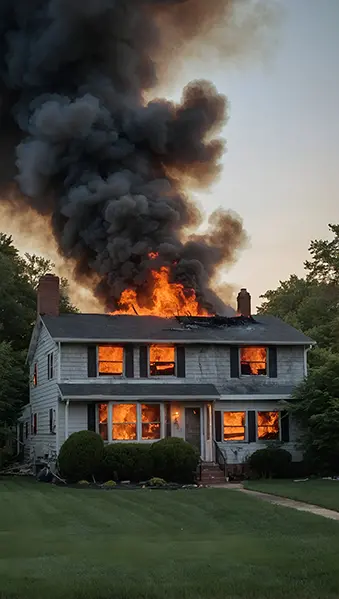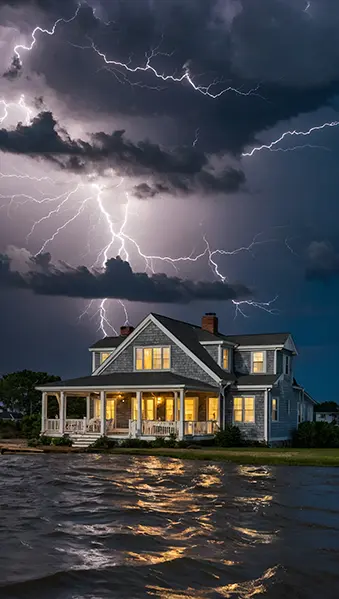What You Need to Know When Shopping for Homeowners Insurance
What You Need to Know When Shopping for Homeowners Insurance

Understanding Homeowners Insurance
Homeowners insurance is essential to protect your investment in your home. It provides coverage to repair or replace your home and its contents following damage caused by events like fire, smoke, water, theft, vandalism, or storms, referred to as ‘perils.’
A standard homeowner’s insurance policy typically covers:
- The structure and outbuildings: Protection for your home’s structure, including any attached or detached outbuildings.
- Essential systems: Coverage for heating and cooling systems, including components like furnaces and water heaters, if damaged by a covered event.
- Personal property: Insurance for personal belongings inside your home that are damaged, stolen, or destroyed.
- Liability protection: Coverage for medical and legal expenses if someone outside your household is injured on your property.
Choosing the right homeowners insurance involves finding a company that offers comprehensive coverage, competitive pricing, excellent customer service, and a strong financial foundation.
Factors Influencing Homeowners Insurance Costs
Your homeowner’s insurance premiums can vary significantly based on several factors:
- Location: Homes in areas with high crime rates, expensive rebuilding costs, or strict building codes tend to have higher premiums. Additionally, if your home is far from a professional fire department, your insurance costs may be higher.
- Age and Condition of Your Home: The condition of your home’s major components, like the roof and furnace, plays a significant role in determining your premiums.
- Home Features: Security systems, fire alarms, and smart home technology can help lower your insurance costs.
- Endorsements: Adding extra coverage for valuable possessions or specific risks can increase your premiums.
- Deductible: A higher deductible generally leads to lower monthly premiums.
- Claims History: A history of frequent claims on the property, even from previous owners, can result in higher rates.
- Credit Score: Insurers use your credit score to help determine your premium, as it reflects your financial responsibility.
Optional Coverages and Endorsements
Beyond the standard coverage, you can tailor your policy with additional endorsements to meet specific needs:
- Earthquake Insurance: Essential if you live in an area prone to earthquakes, covering the cost of rebuilding or replacing contents after an earthquake.
- Mobile or Manufactured Home Coverage: Specialized coverage for non-permanent structures like mobile and manufactured homes.
- Windstorm Coverage: Protects against damage from wind, hail, and other severe weather events.
- Water Backup Coverage: Covers damage caused by water backup from sewers, sump pumps, or clogged drains.
- Replacement Cost Coverage: Ensures you receive the full value to replace personal belongings after a covered peril, rather than their depreciated value.
- Equipment Breakdown Coverage: Pays for repairs or replacements of major appliances and systems due to wear and tear.
- Identity Theft Coverage: Provides protection against financial losses due to identity theft, including credit repair assistance.

Flood Insurance: A Crucial Addition
Standard homeowner’s insurance does not cover flooding. If you live in a flood-prone area, separate flood insurance is essential. According to FEMA, even one inch of floodwater can cause up to $25,000 in damage. To assess your flood risk, use FEMA’s interactive flood map and explore insurance options through the National Flood Insurance Program or your insurer’s flood underwriter.
Tips for Lowering Your Homeowners Insurance Premium
After selecting the right coverage, there are strategies to reduce your premium:
- Increase Your Deductible: Raising your deductible from $500 to $1,000 could lower your premium by up to 25%.
- Home Upgrades: Enhancing your home with impact-resistant roofing or hurricane shutters can reduce the risk of storm damage.
- Loyalty Discounts: Staying with the same insurer for 5-10 years may earn you a discount of 5-10%.
- Home Security: Adding smoke detectors, home security systems, and deadbolt locks can lower your premiums. Installing a sprinkler system or advanced security devices can lead to even greater savings.
- Regular Maintenance: Keeping your home in good repair, like fixing loose decking or trimming overhanging branches, can help prevent accidents and reduce the need for claims.
Explore Available Discounts
Many insurance companies offer discounts that can help you save:
- Multipolicy/Bundling: Combining your homeowners and auto insurance policies for a discount.
- New Homebuyer: First-time buyers may qualify for special discounts.
- Renovated Homes: Recent renovations can lower your premiums by reducing the likelihood of claims.
- Claim-Free: Maintaining a claims-free record for a set period can lead to savings.
- Military: Discounts are often available for active-duty service members, veterans, and their families.
